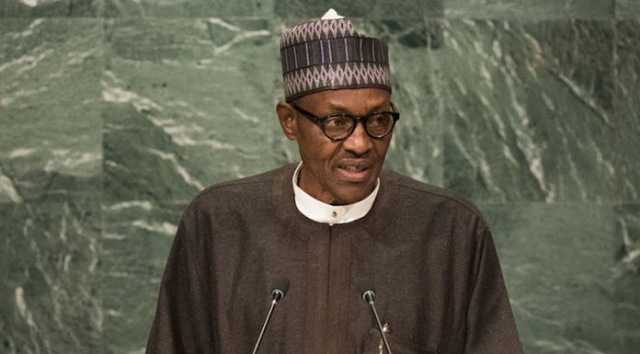- Promises more impactful reforms
- Businesses demand cost reduction
President Muhammadu Buhari Thursday in Sochi, Russia, where he is on a state visit, hailed Nigeria’s latest ranking in World Bank Doing Business Index, also called Ease of Doing Business (EoDB), saying the validation has confirmed that the federal government’s strategy is working and promised to push even harder to deliver more impactful reforms.
In the 2020 rating by the Bretton Woods institution, Nigeria moved up remarkably by 15 places, from 146 to 131.
Also reacting to the fresh ranking, the Organised Private Sector (OPS) yesterday welcomed the development and called on the federal government to carry out more reforms to reduce the costs of doing businesses in the country.
According to the business leaders, the federal government should continue to prioritize reforms in the business environment so as to ensure that challenges such as high cost of business and policy inconsistencies, among others, are addressed.
The latest World Bank report documented reforms implemented in 10 areas of business activity in 190 economies over a 12-month period ending May 1, 2019.
The 10 areas measured in the report were starting a business, dealing with construction permits, getting electricity, registering property, getting credit, protecting minority investors, paying taxes, trading across borders, enforcing contracts and resolving insolvency.
It stated that the 10 economies where business climates improved the most were Saudi Arabia, Jordan, Togo, Bahrain, Tajikistan, Pakistan, Kuwait, China, India, and Nigeria.
These nations, according to the World Bank Group President, David Malpass, fostered “market-oriented development and broad-based growth by creating rules that help businesses launch, hire, and expand,” and removed “barriers facing entrepreneurs generate better jobs, more tax revenues, and higher incomes, all of which are necessary to reduce poverty and raise living standards.”
Reporting on Sub-Saharan Africa, the World Bank said: “Economies in this region continued to improve their business climates, the pace of reforms has slowed, and the region lags other parts of the world in terms of reform impact and implementation. Economies of the region enacted 73 reforms, down from a record high of 108, and the number of countries implementing at least one reform fell to 31 from 40. While reform efforts continued in many countries, much needs to be done on performance and ensuring the impact of the reforms. Only two Sub-Saharan African economies rank in the top 50 on the ease of doing business rankings while most of the bottom 20 economies in the rankings are from the region.”
Reacting to the feat achieved by Nigeria in the ranking, the Director-General, Nigeria Employers’ Consultative Association (NECA), Mr. Timothy Olawale applauded the recent reforms carried out by the Buhari administration, leading to the improvement in the country’s ranking in the World Bank Doing Business Report.
The reforms that contributed to the leapfrog in the country’s ratings, according to Olawale, included efforts of the Corporate Affairs Commission (CAC) in the new electronic platform for registering businesses and linking the platform with that of Federal Inland Revenue Service (FIRS) for instant generation of Tax Clearance Certificate number (TCC), improvement in the land administration processes that enhanced transparency and digitalisation of the process and connectivity to electricity was noted as areas of improvement, most especially the collaboration with the vendors (certified engineers) for connecting new subscribers.
The reforms, he noted, also included the recent improvements that made commercial litigation of smaller cases more efficient with the introduction of pre-trial conferences as well as the Nigeria Customs Services (NSC) integration of more agencies into its electronic data interchange system and the Nigerian Ports Authority (NPA) launch of e-payment system, which aided the speeding up both exports and imports transactions.
He emphasised that the reforms went a long way to place the Nigerian economy among the world’s top improvers.
He, however, reiterated that while, “we note and commend the efforts of the federal government in promoting EoDB, the harsh realities remain that the operating environment is still bedeviled with huge contradictions. While the government is making efforts to ease the pains of businesses, some of its regulatory agencies are doing the direct opposite.
“The agencies’ actions, sometimes bordering on illegality and blatant disregard for court pronouncements are stifling the environment making it inhospitable for businesses to operate.”
He suggested that for businesses to remain competitive, “government must rein in the excesses of some regulatory agencies, promote social dialogue and continuous engagement with the OPS, create investments’ favourable environment and institutionalise a clearing desk in the presidency where businesses can give regular and useful feedback to government on the implications of monetary and fiscal policies on the operators in the real sector.
Also, the Director-General of the Manufacturers Association of Nigeria (MAN), Mr. Segun Ajayi-Kadir, told THISDAY that there were real efforts by the government to improve the EoDB in the country that helped to earn Nigeria an improved rating in the World Bank’s study.
However, Ajayi-Kadir said it would be more important to match up the favourable ranking with direct positive impact on the cost of doing business in Nigeria, which is the main thing that has been crippling the competitiveness of the Nigerian private sector and an issue the OPS has been agitating for a long time.
“We have improved in terms of having the required policies and regulations but not in terms of cost of doing business, especially in the areas of cost of compliance to regulations and infrastructures that are provided by the private sector in order to be able to do business like power, water, roads etc.,” Ajayi-Kadir said.
He stated that there were different components of measuring the EoDB, adding: “I think we need to excel on all front in order to have qualitative business environment. Currently, we are still challenged by various constraints like process, cost and timeliness. We expect any improvement in our country’s EoDB to have positive impact on these areas of constraints.”
The Director-General of Lagos Chamber of Commerce and Industry (LCCI), Mr. Muda Yusuf, welcomed the World Bank’s report.
However, Yusuf stated that the OPS wanted something that would address the fundamental issues constraining investment environment in the country.
These issues, according to him, include infrastructure, policy volatility, multiple taxation, security challenges, ports and maritime challenges and regulatory constraints.
“We need to address all these issues, which are encountered on daily basis by businesses in the country and not one-off matters like business registration that were captured by the World Bank’s data,” Yusuf said.
He added that “security challenges were not captured by the bank. But we all know that no investor will go to Borno State and do business with ease of mind because of security challenges there.”
According to the Director General of Nigerian Association of Chambers of Commerce, Industry, Mines and Agriculture, Ayoola Olukanni, the World Bank’s EoDB ranking was an important metric for indicating the ease of conducting business in the countries surveyed.
Olukanni said it should be noted that a country could move up the ranking simply because other countries previously ranked higher have performed worse.
“That being said, it is our position that the scores awarded to the 10 different areas of measure are reflective of the realities on ground in Nigeria,” he added.
He also attributed Nigeria’s improved ranking to its performance in starting a business, getting credit, dealing with construction permits, and protecting minority Investors.
Buhari Hails Nigeria’s New Ranking
Meanwhile, Buhari yesterday in Sochi, Russia, hailed the World Bank’s 2020 Doing Business Index, which ranked Nigeria 131 out of 190 countries, 15 places up from its 146th position last year.
A statement by the president’s spokesman, Mr. Femi Adesina, said the report, also named Nigeria one of the top 10 most improved economies in the world for the second time in three years.
It also said Nigeria was one of the only two African countries to make this highly prestigious list, noting that with this year’s leap, Nigeria has improved an aggregate of 39 places in the World Bank Doing Business index since 2016.
It explained that the Doing Business Index is an annual ranking that objectively assesses prevailing business climate conditions across 190 countries based on 10 ease of doing business indicators.
The index captures ease of doing business reforms that have been validated by the private sector and offers comparative insights based on private sector validation in the two largest commercial cities in countries with a population higher than 100 million. The report consequently featured Lagos and Kano for Nigeria.
Adesina said Buhari welcomed the development, saying “the movement of 15 places to 131 as well as the recognition being given to Nigeria as one of the top 10 most improved countries, that have implemented the most reforms this year, is significant because we were not even able to achieve some of the key reforms we had pursued, but what we have done so far is being recognised. This validation confirms that our strategy is working and we will continue to push even harder to deliver more impactful reforms.”
According to the statement, with the impending ratification of the Companies and Allied Matters Bill and the introduction of the Business Facilitation (Omnibus) Bill, 2019 in view, along with other pending and ongoing regulatory, judicial and sub-national reforms, the president reasoned that “the announcement by the World Bank indicates that our mandate to move into the top 70 doing business destinations by 2023 remains achievable.”
Adesina said Buhari was briefed on the rankings by the Minister of Industry, Trade and Investment and the Vice Chairman of the Presidential Enabling Business Environment Council (PEBEC), Chief Niyi Adebayo, in Sochi, Russia.
“The steady improvement in Nigeria’s ease of doing business score and rank is a testament to the reforms implemented by this administration over the past four years in line with the reform agenda being implemented at national and sub-national levels across the country since the establishment of the Presidential Enabling Business Environment Council (PEBEC) by President Muhammadu Buhari in July, 2016.
“The PEBEC works towards the fulfillment of the projections of the Economic Recovery and Growth Plan (ERGP 2017-2020), which is striving to deliver sustainable economic growth in Nigeria by restoring growth, investing in our people, and building a competitive economy as we work towards delivering Mr. President’s mandate of bringing 100 million people out of poverty.
“The 2020 Doing Business report from the World Bank has reaffirmed the commitment of the newly constituted PEBEC to making Nigeria a progressively easier place to do business and removing the bureaucratic constraints to doing business in the country as we forge ahead in this Next Level,” the statement added.
Adesina explained that PEBEC, chaired by Vice President Yemi Osinbajo, with 13 ministers as members, amongst others, has through the Enabling Business Environment Secretariat, collaborated with ministries, departments and agencies (MDAs), the National Assembly, the judiciary, state governments and the private sector to carry out over 140 reforms so far in a bid to remove bureaucratic constraints to doing business in Nigeria and making the country a progressively easier place to start and grow a business.
Buhari Building a Global Economy, Says APC
Meanwhile, the All Progressives Congress (APC) has commended the president on the latest World Bank ranking which sees Nigeria jump 15 places in the institution’s Ease of Doing Business global ratings.
The National Publicity Secretary of the party, Mallam Lanre Issa-Onilu, in a statement issued yesterday, said since the launch of the National Action Plan on Ease of Doing Business, the Buhari administration has aggressively implemented economic reforms and progressively reduced the challenges faced by Small and medium-scale enterprises (SMEs) when getting credit, paying taxes, amongst others, by removing critical bottlenecks and bureaucratic constraints to doing business in Nigeria.
Issa-Onilu added that with Nigeria’s latest ranking, it was evident that the Buhari administration was building a globally competitive economy and consolidating on the country’s status as Africa’s biggest economy.
Source: THISDAY












